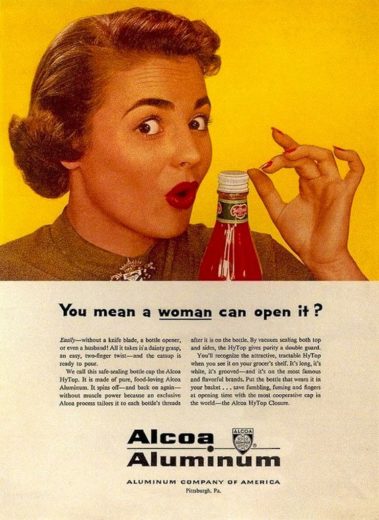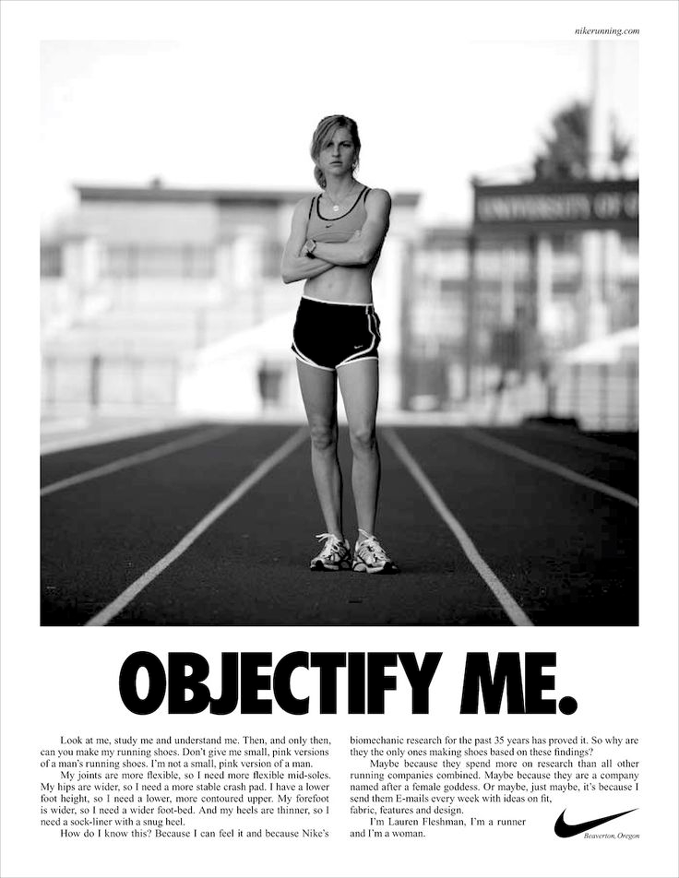Gender stereotypes and identity have become a hot topic recently. Thanks to the #MeToo movement, the topic has received even more much needed attention. We’ve long known that advertising influences society’s view of men and women and their roles. So, it’s not surprising that brands have interjected themselves into this developing conversation through “gendered” campaigns. Before we as marketers plan our path forward perhaps we should first take a look back. As they say, if you don’t learn from history you’re doomed to repeat it.
Femininity in Advertising
Historically speaking women have been most negatively impacted by the way they were presented in advertising. Femininity is defined by a set of attributes, behaviours and roles generally associated with women. Traditionally these traits have included gentleness, empathy, humility and sensitivity. All positive traits, but quite limiting.
But ads don’t always merely reflect society, sometimes they invent it. Advertising has created and reinforced gender stereotypes and identities. Early on ads only showed women in their own private homes – a women’s place was in the home. Whereas men were rarely shown there. Housekeeping Monthly went so far as to create a good wife’s guide.
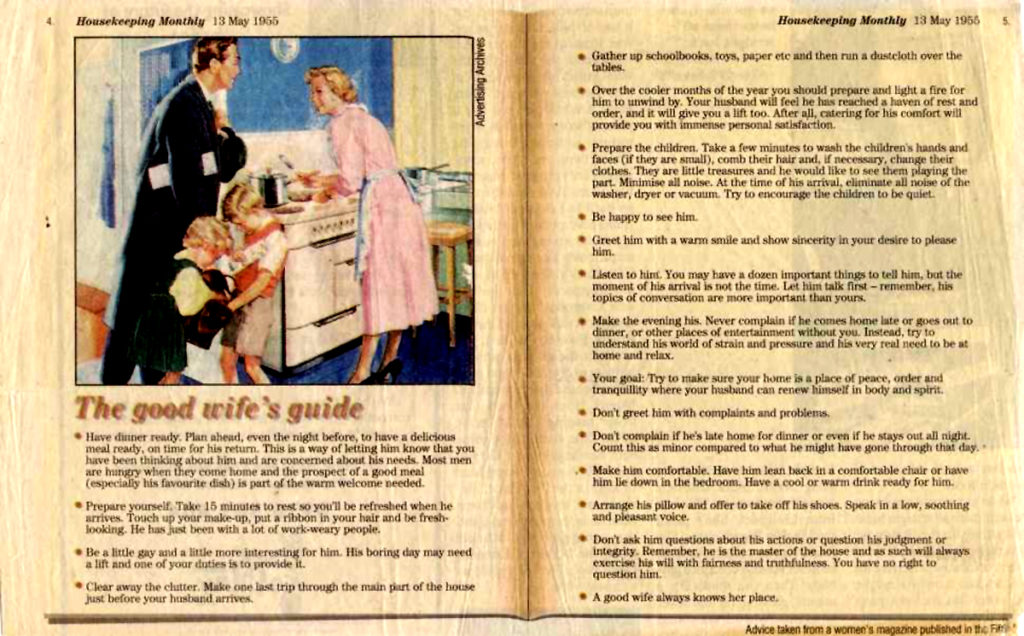
In ads women are often portrayed as playful, submissive and powerless. They’re often urged to pursue beauty and sex appeal, which is part of submission. Women were often represented in a demeaning way with a composition that was frequently sexually suggestive. Take the Burger King “Super Seven Incher” whose sexual connotation and implication was anything but subtle – and this was as recent as 2009!
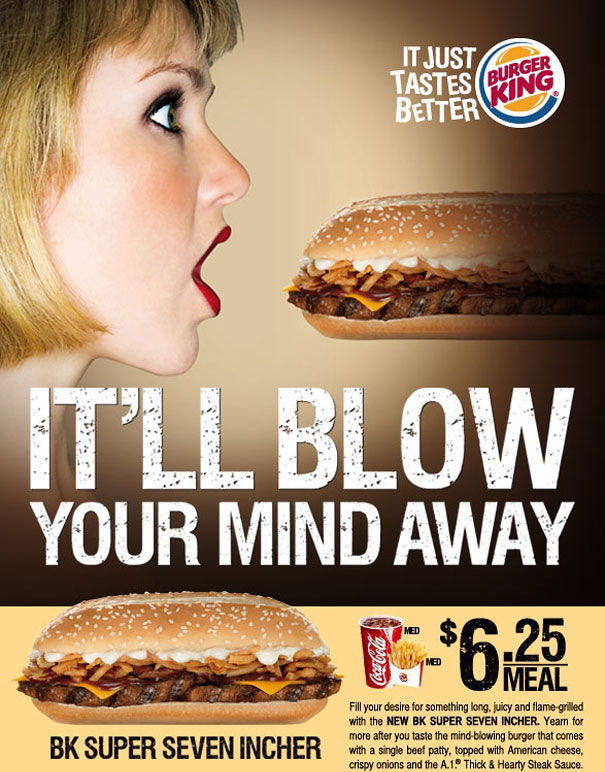
Ads like the ones from Wonderbra encouraged women to use their bodies as sexual objects that should be used to gain and hold attention. But it wasn’t enough for Wonderbra to objectify the model in this advertisement, no, to add insult to injury they played off of another stereotype that presume she should also know how to cook.
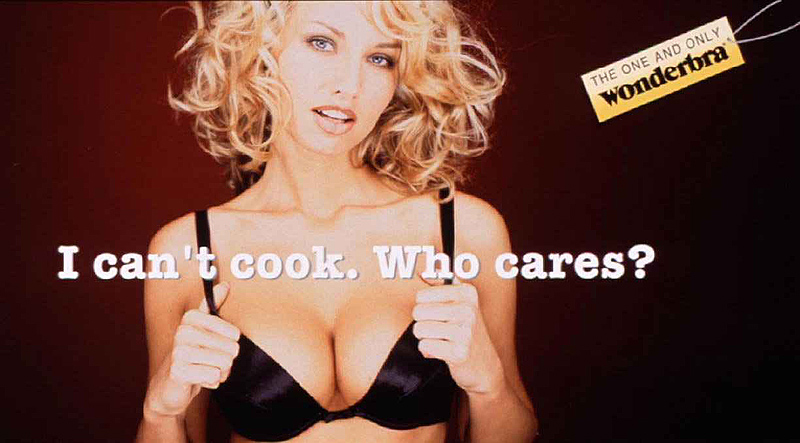
In 2013, GoDaddy’s Super Bowl ad featuring Bar Refaeli had everyone talking. But it wasn’t the make-out session that sparked the controversy, it was the characterization of the women as “the sexy one” and the man as “the smart one.”
This Diet Coke commercial featured a slew of married women in an office who all stopped at the same time each day for their “Diet Coke break.” They’d gather at the window to watch the male construction worker take his shirt off while Etta James’ “I just want to make love to you” played. For once it was the man who was being objectified and the women who were exercising their right to look at sex for pleasure as men had done for so long. Did it represent a step forward for feminism or was it a case of do two wrongs make a right? You decide.
Masculinity in Advertising
Historically speaking men have been most associated with qualities or attributes that were regarded as characteristic of men. They were encouraged to be strong, fearless, to never show weakness, reveal emotions or be vulnerable. The term, “Man up” essentially means to embrace all of these “rules.” In the US “The Marlboro Man.” represented the pinnacle of masculinity.
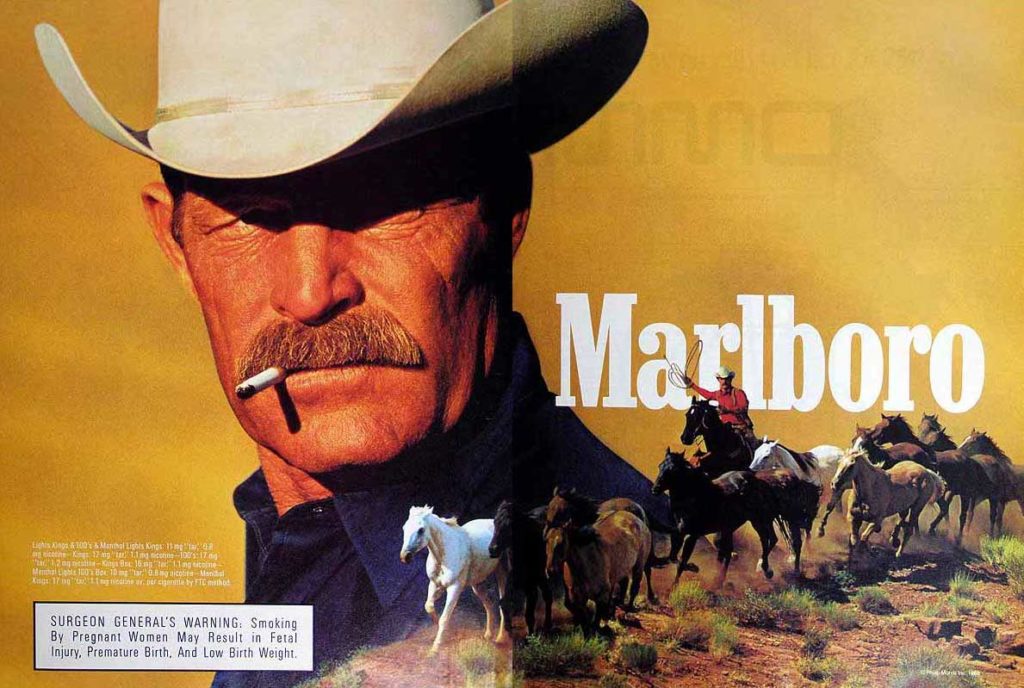
He exuded traits like strength, courage, independence, leadership, and assertiveness. All good traits mind you, but these false ideas of masculinity create pressure. They force men to fall into a rigid, narrow stereotype and negatively impacts the confidence and self-image of those who don’t. Miller High Life did a slew of highly entertaining commercials that leaned heavily on these clichés of what it means to be a man.
Advertising that depicts this narrow definition of masculinity doesn’t just negatively affect men but society as a whole. Ads suggest how men should act towards and treat woman and this directly influences the equality of the genders. What young boys see in the media has a direct impact on how they think about themselves and how they view and treat girls.
Probably the biggest offender out there is AXE body spray. Its ads completely objectified women and portrayed them as unable to control their sexual impulses when around men wearing AXE. Ironically, AXE is owned by Unilever which also owns Dove. As a House of Brands, Unilever promotes its sub-brands with no mention or association to the corporate brand. That’s how on the one hand AXE has gotten away with completely objectifying women while Dove has been branded in such a way that empowers them. Two completely contradictory strategies for two separate target markets. But as we’ve discussed brands don’t live in a vacuum, nor do they only affect their target market. This is why AXE has been accused of creating Toxic Masculinity which occurs when traditional cultural masculine norms are exaggerated to such an extent that they can be harmful to men, women and society overall.
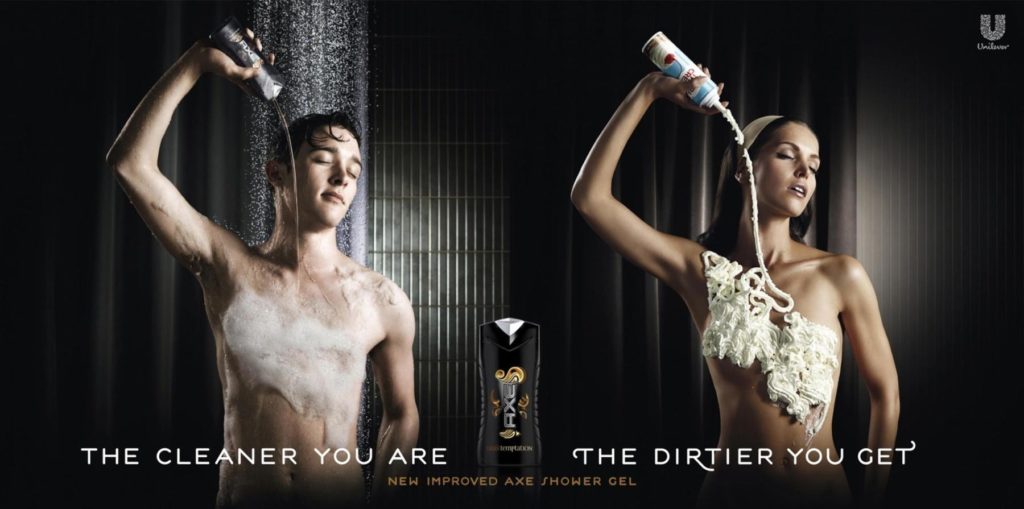
Changing Perceptions of Femininity: The Brands and Campaigns
Thankfully, the conversation about “femininity” is changing. Brands are starting to do their part to change perceptions and create equality between genders. Essentially undoing the damage that they’ve helped to create. For femininity this has meant a shift away from being submissive and powerless – to being empowered. And by challenging beauty stereotypes, a more healthy definition has surfaced, including a more positive body image. Special K produced a commercial in 1998 that did just that by ironically featuring men to underscore in a humorous manner that women needn’t obsess about superficial definitions of beauty.
Dove, Real Beauty
One of the most successful brands that have pioneered this changing perception of femininity is Dove. Their “Real Beauty” campaign started a global conversation that widened the definition of beauty. The main issue being targeted was the repetitive use of unrealistic, unattainable images, which consequently pose restrictions on the definition of beauty. They selected real women whose appearances are outside the stereotypical norms of beauty. The real women were attractive and likeable to their female audience because they were relatable and provided a “fresh” perspective within the media.
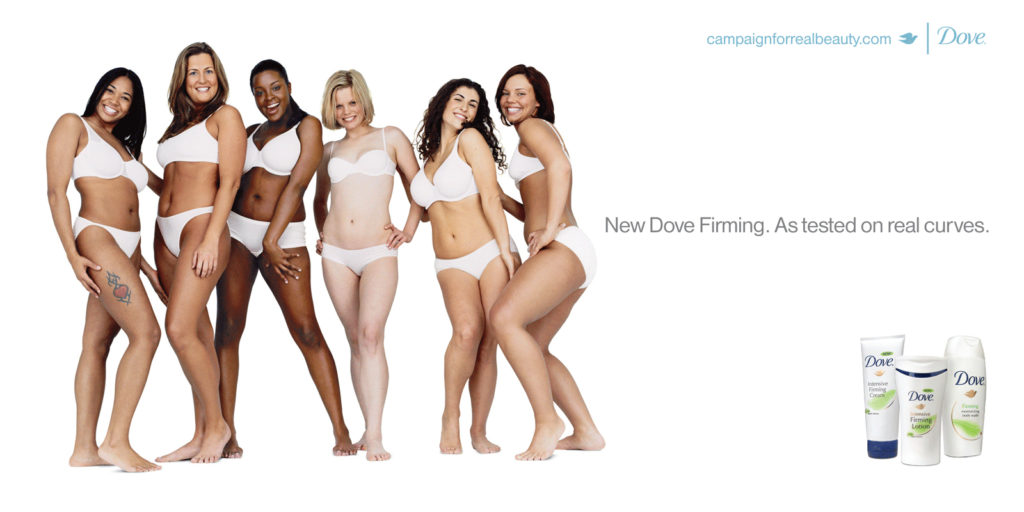
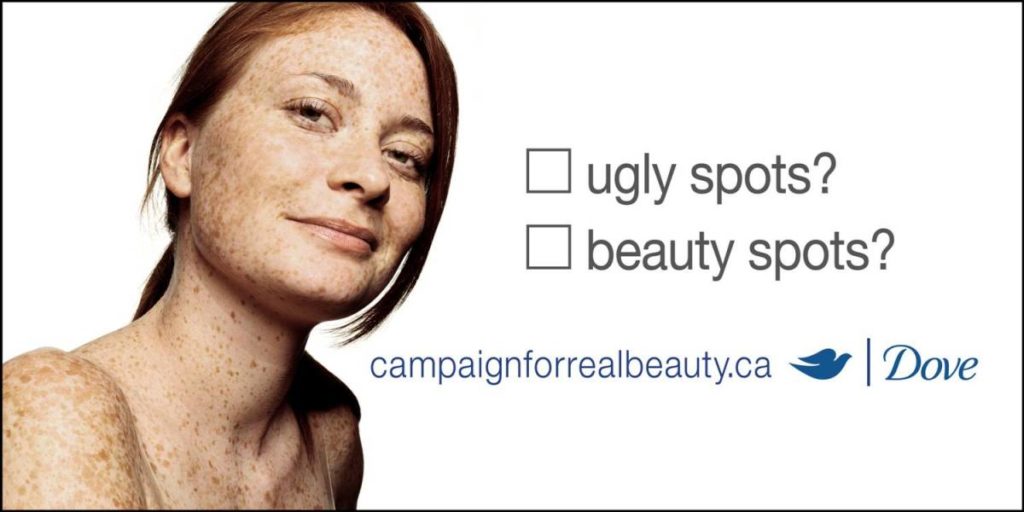
The tipping point for the campaign was their launch of the, “Evolution” commercial. For many women, it resonated as it highlighted the very narrow definition of beauty they were forced to grow up with and struck a chord by opening their eyes to how images were manipulated to fit those false ideals.
Another Dove commercial, “Sketches” highlighted the effect of a lifetime of being bombarded by unattainable standards. In dramatic fashion, we see the consequences of what happens when our self-esteem has taken such a hit. Not surprisingly, we become our own worst critic.
Nike, Objectify Me
Nike has also stepped up to the plate to shift perceptions. Their “Objectify Me” ad stopped people in their tracks. These words had historically had a negative connotation so it was intriguing why a female would request it. The ad featured Lauren Fleshman, a long-distance running champion. Once drawn into the ad the reader was rewarded and suddenly it all made sense. She wants to be objectified because she trusts Nike to obsessively design a shoe based on her needs as a female athlete, which are totally different from those of a man.
Always, #LikeAGirl
The Always #LikeAGirl campaign changed the meaning of the phrase “like a girl.” Suddenly it switched from being an insult to being the ultimate compliment. Research told Always that at puberty, 50% of girls felt paralyzed by the fear of failure. Societal pressure to be perfect drove this fear of failure and it turned out that because of it 80% of girls avoided trying new things. So the mission of the #LikeAGirl campaign was to make sure that girls everywhere kept their confidence throughout puberty and beyond.
Changing Perceptions of Masculinity: The Brands and Campaigns
Marketers are also changing the conversation on what it means to be a man. This is important because the way men are portrayed impacts not only the definition of masculinity, but also gender equality and the conversation about feminism. More recently brands have encouraged men to be more vulnerable and to embrace what makes them unique. The male identity is becoming broader and it’s now ok for a man to be human. In advertisements to men, women are also been portrayed and treated in a more respectful manner.
AXE, Find Your Magic
As one of the biggest offenders of sexism AXE has done a complete about-face. Their “Find Your Magic,” campaign is the opposite of their earlier hyper-masculine and sexist ads. No longer do they portray women throwing themselves at men wearing AXE. Instead attraction is shown as a game of equals. It’s about connection, not conquest. Lynx, AXE’s sister brand has taken a similar approach.
Schick Hydro, The Man I Am
Schick Hydro recently launched “The Man I Am,” campaign to combat the fact that research showed 2 out of 3 men felt pressure to “act like a man” and don’t believe the media shows an accurate depiction of men. The campaign celebrates individuality and authenticity by featuring real men who were chosen for the way they expressed themselves in user-generated content.
As an extension of the campaign Schick is also rolling out named “Locker Room Talk,” features a series of conversations with iconic guests centered around the evolving definition of positive masculinity. After President elect Donald Trump, on the now infamous Access Hollywood bus, referred to his own brand of toxic masculinity to Billy Bush as merely, “locker room talk” it seemed apropos. Beyond reclaiming the phrase “locker room talk,” the goal of the series is to help men open up and challenge some outdated ideas about what it means to be a man. In bringing the campaign to the Canadian market, Schick called upon Gary Roberts and Zach Hyman in this episode.
Gillette, The Best Men Can Be
Gillette recently put a twist on their long-time tag line, “The best a man can get,” by producing a commercial to address negative behaviour among men. The commercial dares male viewers to be, “the best men can be.” It addresses negative behaviours such as bullying, sexism, sexual misconduct and toxic masculinity. By acknowledging social movements such as #MeToo it seeks to promote a more positive view of masculinity. Challenging the notion that, “boys will be boys,” which is far too often used to excuse inappropriate language and actions.
It has received a fair amount of backlash – that real men have to be told what to teach their sons. But others don’t see the problem with a commercial that asks men to hold one another accountable and serve as positive role models. Regardless of what side you’re on, one thing that can be agreed upon is that when visiting the Gillette website, it all seemed disingenuous as the messaging wasn’t supported there. Instead it just sought to sell consumers razors. A disconnect that came across as inauthentic and missed the mark.
DOVE MEN+Care, #DearFutureDads
DOVE MEN+Care has recently launched their own campaign called #DearFutureDads that frames modern masculinity by the way men care. You can tell what’s important to someone by how they spend their time, so DOVE MEN+Care decided to champion Paternity Leave for all dads. After all, being a great parent is mostly about just being there. Most dads want to be involved in their kid’s lives but societal stigmas around taking leave, fear of repercussions at work and lack of paid leave often prevents them from staying at home. The campaign sought to change the conversation and demonstrate how paternity leave is important for all: children, men, women, families and society.
It also encouraged them to visit the website which unlike the Gillette website was not self-serving. Instead it was authentic and provided information and resources for dads considering taking paternity leave. The campaign started a conversation to combat societal pressure and when people commented they facilitated the conversation. The campaign raised awareness of the issue and helped to make paternity leave acceptable – the right thing to do.
GENDER IN FLUX
As definitions of masculinity and femininity are organically becoming broader, there is now a trend towards gender-neutrality. There is no doubt that the Me Too movement has had an impact on gender roles. This is starting to be reflected in young people’s buying habits: only 44% of 13 to 20 year-olds always buy clothes designed for their gender. Where this trend will take us is anyone’s guess, but here are the brands that are taking these first brave steps.
Cover Girl, Cover Boy
In fact, Cover Girl has recently made history with its newest spokesmodel – James Charles –their very first Cover Boy in their 60 years in business. James is a 17 year-old makeup artist with 430K followers. He will appear in print, TV and digital ads with Katie Perry and by himself.
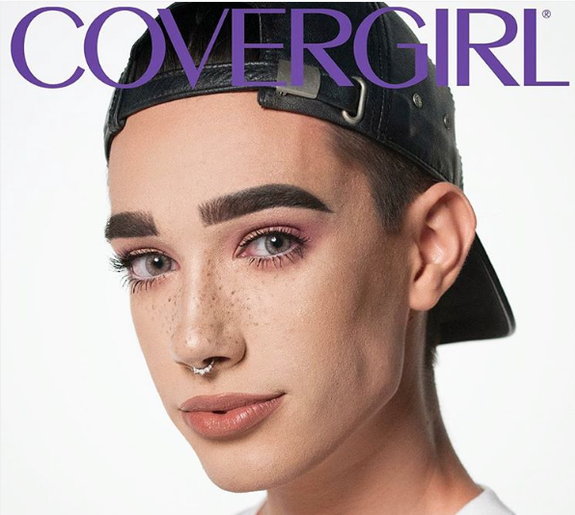
Culture is often slow to change, but we’ve evolved. Men and women no longer need to conform to traditional roles and behaviours. Thankfully attitudes change and new values emerge –we’re all the better for it. Who knows what we will think when we look back in 20 years-time at the advertising we are creating today. Hopefully we will at least say we were moving in the right direction.
